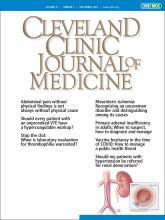On discovering that a patient has an arterial or venous thrombosis, 2 important questions should be considered. First, is a thrombophilia evaluation warranted? Second, if a thrombophilia evaluation is warranted, when should it be conducted? There is tremendous practice variation in this area, which may be a consequence of multiple societies publishing slightly different guidelines and inadequate evidence to guide clinical decisions. In particular, there is a dearth of robust literature to guide clinical practice decisions for patients with an unprovoked thrombotic event. In this issue, Tan et al1 review the available evidence to guide case-by-case decision-making on the need for a hypercoagulable workup after an unprovoked venous thromboembolism (VTE).
INSUFFICIENT EVIDENCE TO SUPPORT ROUTINE TESTING, BUT …
The American Society of Hematology guidelines2 published in 2023 suggest not routinely conducting thrombophilia testing in patients with an unprovoked VTE, noting that the evidence available to support routine testing is weak. However, the estimated relative risk for VTE recurrence is based on the average recurrence incidence across all types of thrombophilia, and the rarity of some of these conditions limits the generalizability of this recommendation. As such, the American Society of Hematology guidelines acknowledge that testing may be considered in cases of unprovoked VTE where the results could influence the anticoagulation duration, and also note that the presence of permanent thrombotic risk factors may dictate the overall duration of anticoagulation.2
Testing for causes of arterial thrombosis
In contrast to VTE, arterial thrombosis has more serious consequences and typically involves end-organ damage, almost always due to atheroembolic events. As with venous thrombosis, routine testing after an index arterial thrombosis event may not be indicated. Nevertheless, for thrombosis in a younger patient without an apparent cause, thrombophilia testing may be reasonable, especially when a family history is established.
A common cause of arterial thrombosis is antiphospholipid syndrome, especially in patients with autoimmune conditions or women with recurrent miscarriage. When considering treatment options for thrombosis in patients with antiphospholipid syndrome, data now convincingly show the superiority of vitamin K antagonists compared with oral factor Xa inhibitors, because factor Xa inhibitors have a higher likelihood of breakthrough arterial thrombosis.3 In such cases, limited thrombophilia panel testing for anti-beta-2-glycoprotein 1 antibody, anticardiolipin antibody, and lupus anticoagulant may be reasonable because the impact on appropriate treatment is clear.2
Paroxysmal nocturnal hemoglobinuria is another serious cause of arterial thrombosis to consider, especially when hepatic venous outflow obstruction or anemia with hematuria is present. It is diagnosed by flow cytometry at most institutions.4
Type II (autoimmune) heparin-induced thrombocytopenia should be considered in patients treated with unfractionated heparin or low-molecular-weight heparin who, after starting anticoagulation therapy, experience a precipitous decline in circulating platelets with coinciding venous or arterial thrombosis (which often manifests as ischemic stroke and purpura on skin examination).5
Provoked events
Theoretically, with a provoked thrombotic event, it would be reasonable to assume that a future thrombotic event would not occur once the provoking factor has been resolved. However, a higher rate of recurrence has been noted in patients with an index VTE event that occurred in relation to a transient risk factor (eg, trauma with fractures, acute illness, pregnancy or puerperium, hormonal contraceptive use) compared with the general population.6 In such circumstances, the risk of recurrence and, in turn, the duration of anticoagulation are determined by the severity and persistence of the risk factor. Accordingly, extended-duration anticoagulation is needed in patients with active cancer or a hereditary thrombophilia that would lead to a persistent thrombotic risk. For patients with a limited, transient risk for thrombosis, anticoagulation can be discontinued, typically after 3 to 6 months, or after shared decision-making with the patient on the risks and benefits of continued anticoagulation. Thus, if the family history is suggestive, thrombophilia testing may be warranted to determine whether a homozygous factor V Leiden mutation or homozygous prothrombin G20210A mutation is present, as these mutations constitute a permanent risk for thrombosis, even after successful treatment with anticoagulation.6
Optimal timing of testing is uncertain
Unfortunately, the optimal timing for evaluation for these diagnoses is difficult to determine, and active treatment with anticoagulation leads to both false-positive and false-negative results in some thrombophilia tests. The presence of acute thrombosis may also limit the interpretation of the test results.
A CASE-BY-CASE APPROACH
In summary, available evidence does not support routine testing for underlying thrombophilia after a thrombotic event, especially hereditary thrombophilia, given the rarity of these conditions. Establishing the presence of thrombotic illnesses and temporally associated risk factors in first-degree relatives is critical during the initial evaluation, but the benefits of testing for an underlying genetic thrombophilia must be discussed with each patient. As Tan et al1 correctly highlight, patients often want to know the underlying cause of the thrombotic event, as this may dictate perceived restrictions from certain activities (contact sports, family planning, planned dietary interventions), and it may also determine the overall duration of anticoagulation therapy. Regardless, further well-designed studies are needed to better inform existing recommendations. Such studies could also potentially identify patients who would benefit from thrombophilia testing and provide further guidance on using laboratory testing more judiciously.
DISCLOSURES
Dr. Bhalla reports no relevant financial relationships which, in the context of their contributions, could be perceived as a potential conflict of interest. Dr. Bishop has disclosed teaching and speaking for Janssen. Dr. Cameron has disclosed consulting for Sanofi.
Acknowledgment
We would like to express our gratitude to the National Institutes of Health for funding support (HL158801-01 to Dr. Cameron).
- Copyright © 2024 The Cleveland Clinic Foundation. All Rights Reserved.






